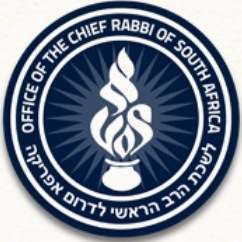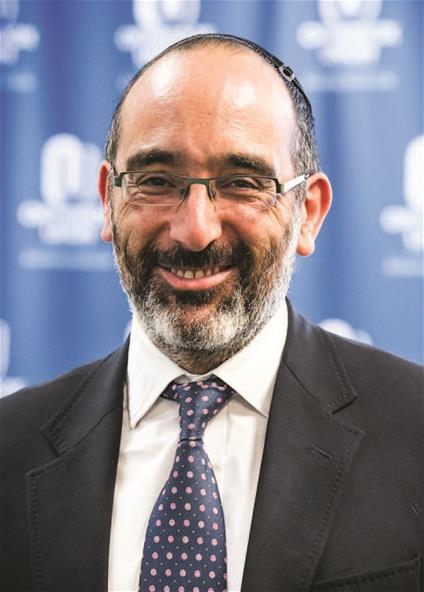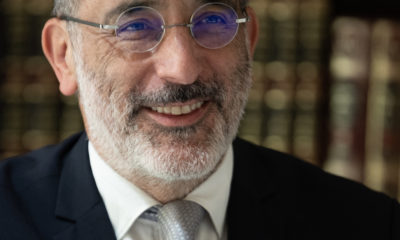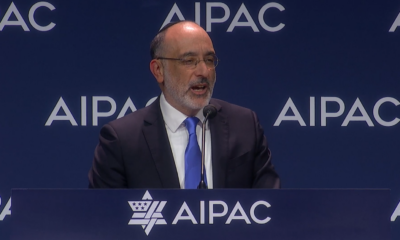
Banner

‘Good Shabbos Rabbi’ on prestigious top 50 list
ANY KATZ
Internationally, says J-Post, “South Africa’s Chief Rabbi is best known for being the founder of The Shabbos Project. What began as a local ‘unity initiative’, bringing together South African Jews from across the religious and geographical spectrums to celebrate and keep Shabbat together, became a full-blown global grassroots movement.”
 J-Post says the aim of the project is “to strengthen family and community relations, uniting Jews as well as sharing in aspects of Judaism that everyone can connect to on various levels”. And it sure has. Last year’s Shabbos Project involved more than a million Jews in 919 cities and 85 countries around the world.
J-Post says the aim of the project is “to strengthen family and community relations, uniting Jews as well as sharing in aspects of Judaism that everyone can connect to on various levels”. And it sure has. Last year’s Shabbos Project involved more than a million Jews in 919 cities and 85 countries around the world.
In March this year, Rabbi Goldstein again made it on the third annual Algemeiner “Jewish 100” list of the top people “positively influencing Jewish life”. The star-studded gala event was held in New York and those honoured included Britain’s Secretary of State for Justice Michael Gove, News Corporation Chairman Rupert Murdoch and famed French philosopher and humanitarian Bernard-Henri Lévy.
Rabbi Goldstein was appointed chief rabbi on January 1, 2005, at 33, the youngest person ever to hold the position, and the first South African-born chief rabbi.
At his official induction ceremony, then-President Thabo Mbeki said: “By their personal example, and through the wisdom of their teachings, religious leaders, such as Chief Rabbi Goldstein, can imbue our country with values of honesty, compassion and self-discipline that are so vital in establishing a truly just and moral society.
 “Indeed, we are blessed to have a chief rabbi who is a formidable Torah scholar [and] whose doctorate is in human rights and constitutional law, including that of our own Constitution.”
“Indeed, we are blessed to have a chief rabbi who is a formidable Torah scholar [and] whose doctorate is in human rights and constitutional law, including that of our own Constitution.”
LEFT: Chief Rabbi Warren Goldstein gives the credit to SA community
The Jerusalem Post gave Rabbi Goldstein’s educational biography, saying that he had studied at Yeshiva Gedolah where he received his rabbinic ordination. He later qualified as a dayan (religious judge) through the Eretz Hemda Institute in Jerusalem. He has a BA LLB (Unisa), and a PhD (Wits).
“In the past decade, he has been the leading force behind a range of interfaith and Jewish initiatives, both in South Africa as well as globally,” read the accolade. “In addition, Goldstein has shown true leadership qualities by eloquently speaking up for Israel in both South African and international media.”
This year’s Shabbos Project will take place worldwide on November 11 (Lech Lecha) and he told The Jerusalem Post that his hopes are for the initiative “to spread further and deeper”.
Related Reads
Interview with JR Online:
In an erev-Yom Kippur interview, Rabbi Goldstein told JR Online: “It’s a credit to the standing of the South African community among world Jewry,”. The chief rabbi says SA Jewry tends to support community activity in general.
“It (the Shabbos Project) has become what it is, because it was so warmly embraced in South Africa,” says Goldstein. “It was because of the enthusiasm of the local community that it was made possible (globally).”
Levels of interest were looking to be stronger and also deeper this year, Rabbi Goldstein said – he expects more people from previous participating places and more places participating.
The latest to sign up for this year, says Goldstein, already Chief Rabbi was Guadeloupe (in the Leeward Islands, part of the Lesser Antilles in the French Caribbean). This is the 993rd community to sign up for 2016, a ten percent increase.
Interview with J-Post:
JP: How do you think the Shabbat Project has affected world Jewry?
WG: The Shabbat Project has unified Jews from across every conceivable divide – language, culture, background, geography and level of observance. It transcends the barriers that seem to separate us and demonstrates what the world can be when all of those divisions disappear. Ultimately, the Shabbat Project has shown that we can reclaim our spiritual heritage and become better people, through experiencing the depth and beauty of Shabbat together. It has rejuvenated family and community life, restored Jewish pride and identity, and strengthened Jewish unity across the globe. The Shabbat Project has shown that together we can achieve great things… It has shown that we can come together, not only when we are forced to, through the hatred of others, but through the pride and joy of our incredible Jewish heritage.
For too long now, true Jewish unity has evaded us, and I think to some extent, the Jewish world has been at somewhat of a loss for what to do. We have seen Jewish unity become something of a pipe dream, an unattainable utopia. But the Shabbat Project has reminded us that it needn’t be.
The Shabbat Project has also shown people the beauty of a Shabbat experience. A unique tranquility and intimacy permeates our homes on Shabbat. No one has to answer the phone or rush off, no one is distracted by the screens of information and entertainment that saturate our world. We are left with a remarkable, uninterrupted haven of love and connection, which allows us to appreciate and focus on what we have in our lives.
Sometimes we give up on making the world into a better place. The Shabbat Project shows that Jews can come together all around the world, in the spirit of unity and inspiration, and change the world for good. If we work together, anything is possible!
What are the plans for the upcoming Shabbat Project?
The plan for this year is for the project to spread further and deeper. What has been remarkable over the last few years has been the sheer number of people who have been involved in driving the project In 2014, there were 1,800 people around the world who partnered in making the project happen. In 2015, that number grew to 5,000. The reports coming in so far show that the level of interest of those on the ground in most cities is higher than ever, and people are excited and passionate about bringing the Shabbat Project to their communities.
Do you have plans for other projects that could potentially affect world Jewry on a similar scale?
Yes. The Shabbat Project began in South Africa, and we have a number of other innovative social and educational projects which have been so warmly embraced by the South African Jewish community – which we would like to share with Jews all around the world. So watch this space!
Also, the Shabbat Project itself has created a worldwide movement of proactive and capable partners. These partners are people who have realized that there is so much opportunity to create a bright and optimistic Jewish future. I believe that this network of passionate leaders will ultimately start to produce new and exciting projects and initiatives that will have a profound effect on our shared future.
Author of four important books:
Chief Rabbi Goldstein has also published four books:
African Soul Talk: When Politics is not Enough (with Dumani Mandela, Nelson Mandela’s grandson);
Defending the Human Spirit: Jewish Law’s Vision for a Moral Society;
Sefer Mishpat Tzedek (a detailed analysis of Torah business law and ethics, with particular focus on competition law); and
The Legacy: Teachings for Life from the Great Lithuanian Rabbis (with Rabbi Berel Wein).








